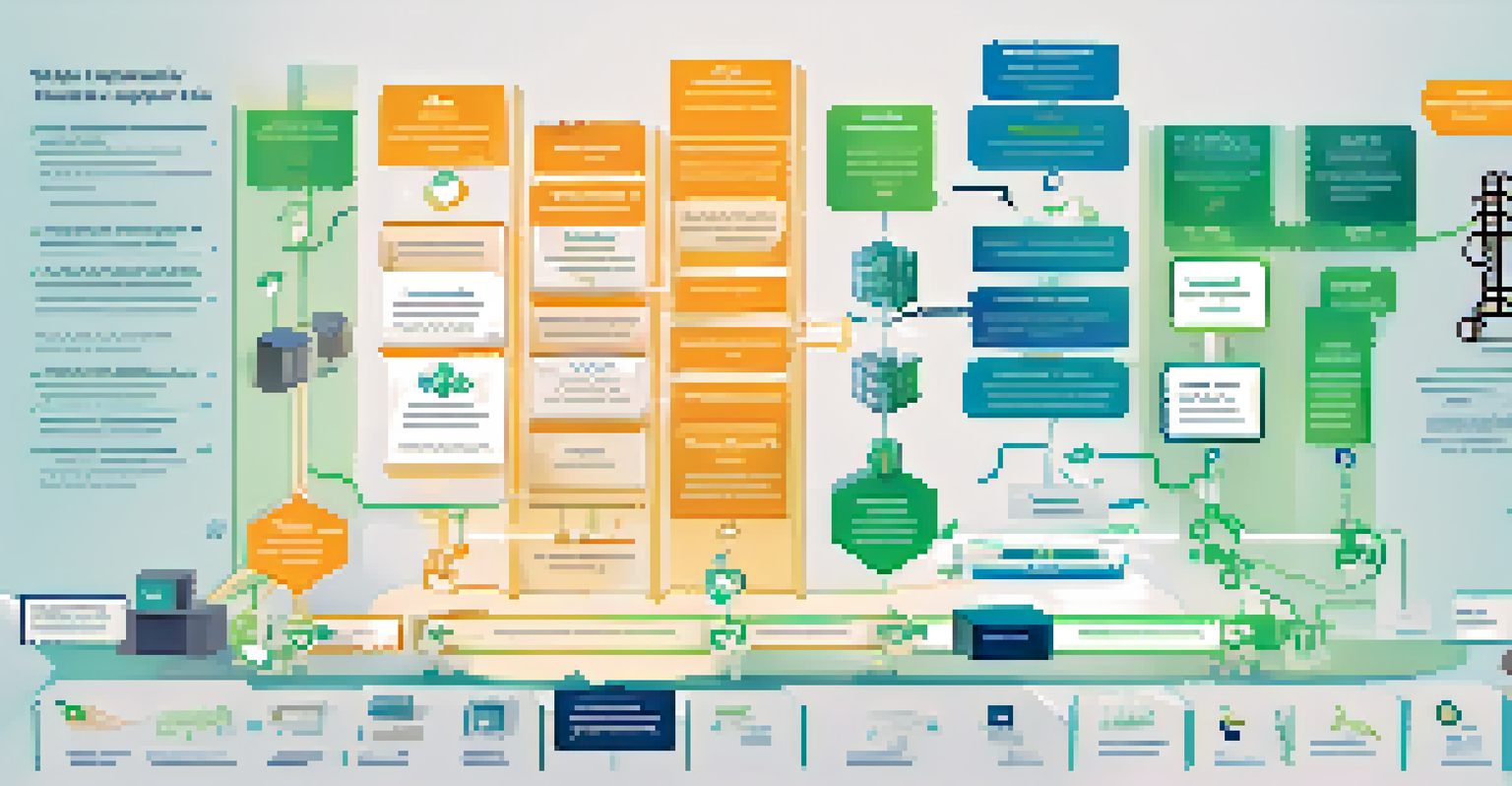Leveraging Blockchain for Real-Time Supply Chain Tracking

Understanding Blockchain and Its Relevance to Supply Chains
Blockchain is a decentralized digital ledger technology that records transactions across multiple computers. This means that once a transaction is recorded, it cannot be altered, ensuring transparency and security. For supply chains, this technology can enhance traceability, making it easier to verify the origin of products and the integrity of transactions.
Blockchain technology is important because it allows the creation of a secure and transparent record of transactions that is immutable and distributed across a network.
Imagine you’re tracking a shipment of avocados from a farm in Mexico to a grocery store in your neighborhood. With blockchain, every step of this journey is recorded in a way that all parties can access and verify. This not only builds trust among suppliers, manufacturers, and retailers but also helps in quickly identifying issues if they arise.
As supply chains grow increasingly complex, adopting blockchain can simplify the tracking process. It provides a real-time view of the entire supply chain, allowing stakeholders to make informed decisions and respond promptly to any disruptions.
Key Benefits of Real-Time Tracking with Blockchain
Real-time tracking through blockchain offers numerous benefits, such as improved efficiency and reduced costs. Because all transactions are recorded in one place, the need for manual paperwork and reconciliation is significantly diminished. This not only speeds up operations but also helps minimize errors that can occur during data entry.

In addition to efficiency, real-time tracking enhances accountability. Each participant in the supply chain can see the same information, which fosters a sense of responsibility. If a delay occurs, it can be pinpointed quickly to understand who is accountable and why, facilitating faster resolutions.
Blockchain Boosts Supply Chain Trust
Blockchain enhances transparency and traceability, allowing stakeholders to track products and verify transactions efficiently.
Moreover, real-time tracking can bolster customer satisfaction. Consumers today are keen on knowing where their products come from and how they were handled. By utilizing blockchain, companies can provide this information transparently, which can enhance brand loyalty and customer trust.
Challenges in Implementing Blockchain in Supply Chains
While blockchain offers promising solutions, its implementation in supply chains isn't without challenges. One significant hurdle is the integration of existing systems with blockchain technology. Many companies may rely on traditional systems that aren't compatible, making the transition complex and costly.
In the future, every supply chain will be powered by blockchain technology, driving transparency, efficiency, and growth.
Another challenge is the need for collaboration among all parties in the supply chain. Blockchain works best when everyone participates and shares information. If even one party is reluctant to adopt or share their data, it can undermine the effectiveness of the entire system.
Additionally, there may be regulatory concerns. Different regions have varying regulations regarding data privacy and security. Companies must navigate these complexities to ensure compliance while still reaping the benefits of blockchain technology.
Real-World Examples of Blockchain in Supply Chain Tracking
Several companies have successfully implemented blockchain technology in their supply chains. For instance, Walmart uses blockchain to track food products from farm to store. This allows them to quickly trace contaminated products back to their source, significantly reducing the time it takes to ensure food safety.
Another notable example is De Beers, which employs blockchain to track the provenance of diamonds. By ensuring that every diamond’s journey is recorded, they can guarantee that they are conflict-free, which appeals to ethically-conscious consumers.
Real-Time Tracking Enhances Efficiency
Implementing real-time tracking through blockchain reduces costs and improves accountability among supply chain participants.
These examples illustrate that blockchain is not just a theoretical concept but a practical solution that companies are actively using to enhance their supply chain transparency and efficiency.
How Blockchain Can Improve Traceability in Supply Chains
Traceability is a critical aspect of supply chain management, and blockchain can enhance this significantly. Each transaction recorded on the blockchain provides a complete history of the product's journey. This level of detail makes it easier to trace the origins of a product and verify its authenticity.
For instance, in the fashion industry, blockchain can help track the sourcing of materials, ensuring that they are sustainably sourced. This not only appeals to environmentally-conscious consumers but also helps brands maintain their ethical standards.
By improving traceability, companies can also respond more effectively to recalls or quality issues. Instead of recalling an entire batch, they can identify specific products that need to be removed from shelves, saving time and resources.
The Future of Blockchain in Supply Chain Management
As technology continues to evolve, the future of blockchain in supply chain management looks promising. Experts believe that we will see increased adoption across various industries, driven by the need for greater transparency and efficiency. Companies that embrace this technology early on may gain a competitive edge.
Additionally, advancements in technology, such as artificial intelligence and the Internet of Things, could further enhance blockchain capabilities. For example, IoT devices can provide real-time data that can be recorded on the blockchain, offering even greater insights into supply chain operations.
Challenges in Blockchain Adoption
Integrating blockchain technology faces hurdles like system compatibility and the need for collaboration among all supply chain parties.
Ultimately, the integration of blockchain could lead to smarter, more resilient supply chains that are better equipped to handle disruptions and meet consumer demands.
Steps to Implement Blockchain in Your Supply Chain
If you're considering implementing blockchain in your supply chain, the first step is to assess your current processes. Identify areas where transparency and efficiency could be improved. Understanding your specific needs will help you tailor the blockchain solution that works best for your operations.
Next, it’s important to engage with stakeholders across your supply chain. Collaboration is key for a successful implementation. This means getting buy-in from suppliers, manufacturers, and distributors to ensure that everyone is on board and willing to share information.

Finally, consider partnering with technology providers who specialize in blockchain solutions. They can guide you through the implementation process, ensuring that you have the right infrastructure in place to make the most of this innovative technology.